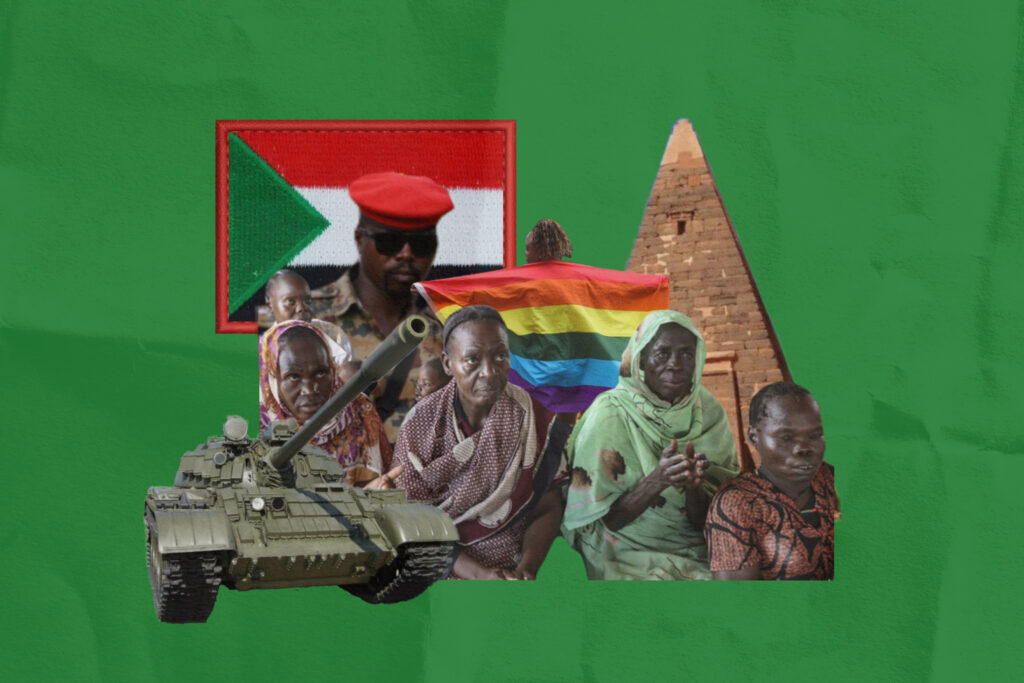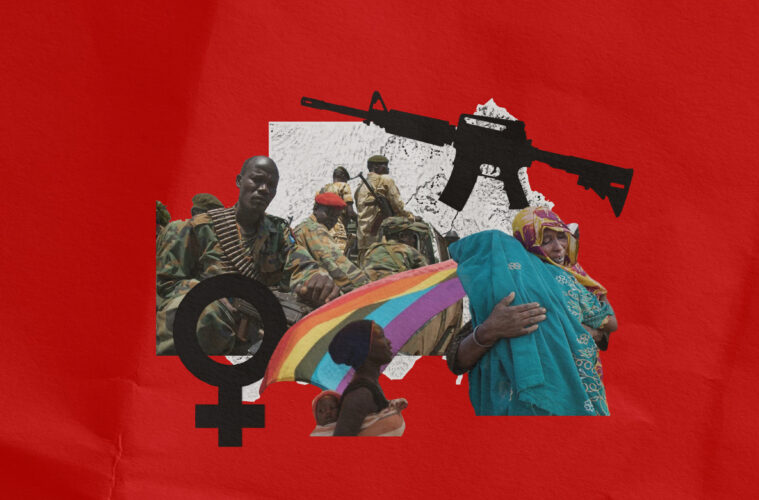Words by Simsim
Artworks by Lina A.
Translation by Hiba Moustafa
This article is a supplement within the “Frenquencies” issue
On April 15, 2023, armed fighting broke out in Sudan between two uniformed military formations – the Sudanese Armed Forces (SAF) and paramilitary Rapid Support Forces (RSF) – spreading to several cities including the capital, Khartoum, Darfur, and Gezira State. The clashes followed weeks of rising political tensions and a deadlock between Abdel Fattah al-Burhan and Mohamed Hamdan “Hemedti” Dagalo, the two generals battling one another for ultimate control of the state and its resources.
According to the latest reports, 20,000 civilians have been killed, though some estimates indicate that the numbers are higher.1 Sudan now has the highest rate of displacement in the world, with more than 8 million internally displaced persons (IDPs) and 3 million crossing the borders into neighboring countries. Gezira State has witnessed the highest number of displacement cases this past month, with the number of displaced persons from the eastern part of the state reaching 119,000 so far.2 The Director of the Unit for Combating Violence against Women and Children, Salimi Isaac, said that the number of documented cases of sexual abuse has risen to 309, including children as young as a six-year-old girl. These cases are just the tip of the iceberg of what is actually happening.3
This article examines the conditions of sexual minorities in Sudan before the war; changes in the ways that political, military, and societal authorities have dealt with them since the war began; and the potential sexual threats and attacks they face at the hands of the warring parties.
Disclaimer: In wars and armed conflicts, sexual/gender minorities face an increasing risk of war crimes, such as physical/sexual/psychological violence, torture, and murder. They often prefer to remain invisible to stay safe, making such violations hard to track and measure.
The Situation of Minorities before the War
Sudan was not a safe haven for sexual/gender minorities. Its British colonial laws, also influenced by religious legislations post-Independence, penalize and even criminalize all behaviors that can be classified as homosexual. Article 148 of the Sudanese Penal Code4 criminalizes sexual activity between men, calling it liwat (sodomy), with punishments ranging from imprisonment to death, in cases of repetition. Articles 151 and 152 on “gross indecency” and “indecent and immoral acts” criminalize sexual acts not amounting to sexual intercourse – both homosexual and heterosexual – and prohibit wearing clothes that don’t align with an individual’s presumed gender based on their sex (in other words, men who imitate women and women who imitate men).
The Sudanese queer community is not only criminalized by the law, but also widely rejected by society. Homosexuality is a social taboo that is difficult to discuss, and many social groups in the country explicitly express their hatred against community members through various forms of verbal, physical, and psychological abuse. Such abuses are fueled by patriarchy and colored by religious regulations that deny sexual minorities their rights.
The 2020 violent incidents that took place at Tawaheen Al-Dahab market in Abu Hamad (north of Khartoum), where a Sudanese citizen was stoned to death and several others were injured because of holding a gay marriage ceremony (as reported by Abu Hamad police),5 are a stark example of the reality that the members of sexual minorities face. They lose their lives with the blessing of Sudanese society, without condemnation or even legal denunciation. And, because addressing the subject outside the common context of hostility would be political suicide, the issue of sexual minorities has been ignored in political spheres. The enormous stigma associated with the cause would yield no political or popular gains.
Violence against Sexual Minorities during the War
As logical as it is for civilians affected by the catastrophic consequences of war and armed conflict to unite, leaving their intellectual and ideological differences and all reasons for division behind them, such a utopian vision unfortunately does not apply to the reality in Sudan. This is especially true when it comes to the LGBTQ+ community.
Social stigmatization that follows sexual abuse, especially of men, constitutes a significant barrier to documentation, and more seriously, it prevents survivors from receiving or even seeking necessary treatment and post-exposure prophylaxis to prevent STIs in case of exposure.
The mobilization and militarization of societies during periods of conflict and war reinforce patriarchal concepts and cause societies to adhere more rigidly to binary social roles. Men are expected to defend their land and protect their property and families, while women are expected to stay away from war to take care of children and the elderly. But what about those who don’t fall within stereotypical heterosexual binaries, whose sexualities and genders are stigmatized as forbidden and unacceptable behaviors?
Dr. Melanie Richter-Montpetit, a senior lecturer at the University of Sussex, argues that toxic masculinity, misogyny, and hatred toward sexual minorities tend to surface in national and military imperialistic movements, indicating a deep-seated belief that women’s bodies are weak and easy to violate among the members of such movements. Hence, sexual violence against women (and men from sexual minorities) occurs frequently.6 One clear manifestation of this fact is how these movements use slogans that liken opposing parties to women or stigmatize them as homosexuals.
Warring parties also do not hesitate to use offensive, homophobic words to stigmatize their enemies whenever their hatred increases. Hemedti7 the Sodomite has become a common insult since the outbreak of war. A queer activist in Sudan said,
I face exclusion whenever I speak about the political situation. My opinions are disregarded by hurling insults and profanities at me without even considering my views. This happens with many queer activists in Sudan to exclude and isolate us from the society and reality we have been most affected by.
Weaponizing Sexual Abuse
Throughout its rule, military authorities in Sudan have used state troops to silence civilians (and particularly minorities) through sexually abusing and torturing them. Such abuses undoubtably escalate in times of war and violent conflict, with state troops in Sudan using sexual abuse as a weapon of war.8 The inhumane war crimes committed against civilians in Darfur – which seem similar to the ones Sudanese face today in the militarily-controlled cities – are a vivid example of this tragic reality.
What’s worse is that the cases of such violations against sexual minorities remain undocumented; the records of government and humanitarian agencies lack any figures or statistics on this. Social stigmatization that follows sexual abuse, especially of men, constitutes a significant barrier to documentation, and more seriously, it prevents survivors from receiving or even seeking necessary treatment and post-exposure prophylaxis to prevent STIs in case of exposure.9
I spoke with a young gay Sudanese man, who told me about the incident of receiving a rape threat,
On my journey out of the besieged city of El-Obeid, there were several RSF checkpoints. At each checkpoint, all the passengers were told to get off the bus, hand-searched, humiliated and robbed. They said that I looked and acted like a woman. They harassed me verbally and physically and threatened to rape me. One of them said, ‘We rape men like you.’ All the way, I was scared, nervous and worried about the things that could happen to me.

Artwork by Lina A.
A non-binary woman told me that RSF has assaulted her and a group of gay friends in Jabra, one of the neighborhoods of Khartoum:
They whipped us, using our identities as insults. They called us ‘sissies.’ They hit me on the head with the tip of a hook. They hung me upside down on the balcony and almost threw me off it. They tortured us, took our money, and forced us to leave our apartment with no clothes on. With so much difficulty, we reached Omdurman, where I could get medical help.
There are many stories and testimonies about violations against sexual minorities in Sudan, but stigma keeps many people silent. An LGBTQ+ person, who is unable to leave one of the rampaged cities, refused to share the abuses, amounting to sexual trafficking and slavery, he has been experiencing at the hands of RSF out of fear for his life and that of other people.
And we cannot overlook the severe lack of friendly and non-stigmatizing psychological aid and support for sexual minorities in this context, who are often already suffering from psychological crises due to stigma, social rejection, and fear of legal prosecution. Reliable and friendly therapy that doesn’t pathologize them has already been rare. Considering the already poor situation before the war, we can only imagine how bad the psychological condition of sexual minorities during war and armed conflict is.
They often face abuse and/or hear about the systematic abuses queer people face. Being separated from their social circles because of intensive military operations and raids in conflict areas, and fleeing to the unknown outside their areas of stability, they become socially isolated. Their isolation is further exacerbated by the ongoing destruction of infrastructure and poor communications. And then, there is the issue of domestic violence that social minorities may experience as a result of prolonged stays with their family; economic autonomy is not always an option in the country’s deteriorating economy. These challenges are encapsulated in the reflection of one member of the Sudanese queer community:
I haven’t been feeling well mentally, with the lack of access to antidepressants since the war started. I’ve lost all the psychological support I used to have, especially from my friends of the LGBT+ community. I’ve also lost my job, which provided me with some sort of safe distance from my family that hates who I am.
Minorities and Priorities
Returning to the initial question, what is the importance of discussing issues of sexual minorities in light of the war? To what extent is the discussion considered secondary from reality or swept aside in terms of priorities?
The lack of any data and statistics about sexual minorities in Sudan before and during the war should be enough to indicate the gravity of their situation. The issues they face require immediate attention, and we must fight the toxic rhetoric that stokes violence and violations against sexual minorities, both during and outside of war. Further, there must be safe spaces to facilitate monitoring and documenting these violations and provide emergency legal and psychological support.
The war hasn’t spared the privileged, let alone the groups that have been rejected and persecuted in the name of law, society, and religion, that are ignored by civil bodies in the region and the world. Providing safe shelter away from the grave danger that threatens their lives in Sudan is a must.
- “Fact-Finding: What Has a Year of War and Destruction Done to Sudan?”
- Situation Report – OCHA – UN, June 24, 2024.
- Musa, Alaaeddin. “Rape: The Dirty Weapon in Sudan’s War,” Altaghyeer, May 9, 2024, accessed June 1, 2024.
- Sudanese Penal Code of 1991.
- “Details on What Happened in the Gay Marriage Ceremony in Abu Hamad,” Almashhad Alsudani, March 8, 2020.
- Researching War Feminist Methods, Ethics and Politics. Ed. Annick T. R. Wibben. Rutledge, May 19, 2016.
- Commander of the Rapid Support Forces.
- Mass Rape in North Darfur. Human Rights Watch, 2014.
- Sexual Violence – Medical Activities. Médecins Sans Frontières. Accessed July 22, 2024.

